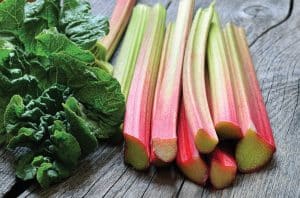February is a month in which the winter blues can be felt most acutely here in the UK. We look longingly towards the equator, yearning for tropical sunshine and exotic fruits – and those of us who didn’t cunningly plan a holiday look on our jet-setting friends with envy.

The Telegraph reports that we invest in expensive SAD lamps in the hope that light therapy will lift us from our slump, and crave sugary foods and carbohydrates such as chocolate, pasta and bread.
But don’t be downcast: there may be no juicy British strawberries to be found on the roadside, but there’s still plenty of comforting British produce to be sought out at this time of year.
Much of it lends itself perfectly to warming winter soups, stews and casseroles, and is best enjoyed accompanied by a roaring open fire. In terms of vegetables, there’s the the on-trend cauliflower (just don’t buy a cauliflower ‘steak’ in plastic packaging), purple sprouting broccoli, East Anglian mustard, rainbow chard and kale – with the promise of wild garlic, radishes and sorrel soon to follow in March.
In old English, the month of February was known as sprote-kalemonath – the month of sprouting cabbage. We can only assume that our ancestors had plenty to go around.
Admittedly, our larder is rather sparse when it comes to fruit, but for apples and pears – synonymous with homemade crumbles and cobblers. But there is also the emergence of the first tender crop of tart rhubarb to enjoy with lashings of custard.
Yorkshire’s famous ‘Rhubarb Triangle’ is enjoying good growing conditions this year, and the ingredient is also increasingly popular in drinks: Warner Edwards created one of the first rhubarb gins three years ago and has seen sales increase 355 per cent in a year and 8,650 per cent since 2014.
Beyond the vegetable patch and the orchard, on our shores there’s currently an abundance of shellfish including oysters, scallops and mussels. In our waters there’s plenty of flat fish, cod, cuttlefish and bream, and it’s the start of wild salmon season.
It’s also the last opportunity to make the most of certain types of British wildfowl and game. During the ‘closed season’ shooting of certain species is not allowed, to protect animals when they’re breeding and rearing their young. February is the last month for hare, duck and goose. Venison, including roe deer bucks, fallow bucks, red deer and stags, is only available until the end of March. The exception to that is muntjac deer, which has no closed season (animals regarded as pests, such as muntjacs, rabbits and pigeons have no closed season.)
Added bonuses to cooking up a dish with these February ingredients? Firstly, you can feel doubly smug about your decreased carbon footprint – not only did you virtuously refrain from flying out to the Maldives this half term, but neither can anyone accuse your fruit bowl of being an Air Miles Andy.
Seasonal food often tastes better, and can be better value, too. And that’s not even to mention the health benefits of such produce: cauliflower is believed to keep your brain healthy, help unclog your arteries, reduce the risk of degenerative disease, and perhaps even ward off cancer. Meanwhile, according to Taste of Game, game meat is one of the most healthiest available, since it is high in protein but low in fat and cholesterol. This is partly because game is wild and able to walk and roam freely – and therefore doesn’t store so much fat as farm animals. It’s also high in iron and other nutrients.
Game is also considered by many to be ethical: Louise Gray recently explored this idea in her bestselling book The Ethical Carnivore, and named venison her ultimate ‘Ethical Carnivore’ dish. “Venison is perhaps the most ethical meat we can eat in Britain today,” she wrote recently in The Spectator. “Because of a lack of natural predators and a warmer climate, there are as many as one million deer in the UK – the highest number since the Ice Age.”
At a glance | British produce in season in February
Vegetables, herbs, fungus and plants
Beetroot, Brussels sprouts, cabbage, carrots, celeriac, chicory, Jerusalem artichokes, kale, leeks, mushrooms, onions, potatoes, parsnips, purple sprouting broccoli, spring greens, spring onions, squash, swedes, kohlrabi, salsify, shallots, horseradish.
Fruit
Apples (including cooking apples, Granny Smiths, Golden Delicious, Braeburn and Cox’s), pears (comice and conference)
Shellfish and fish
Clams, cockles, mussels, scallops, winkles, oyster, skate, salmon, cod, dover sole, gurnard, haddock, halibut, hake, langoustine, lemon sole, lobster, red mullet, turbot, trout, bream, cuttlefish.
Meat, poultry, wildfowl and game
Venison (including muntjack, roe deer bucks, fallow bucks, red deer and stags), wild duck and goose, hare, pigeon, rabbit, turkey.
(Story source: The Telegraph)

